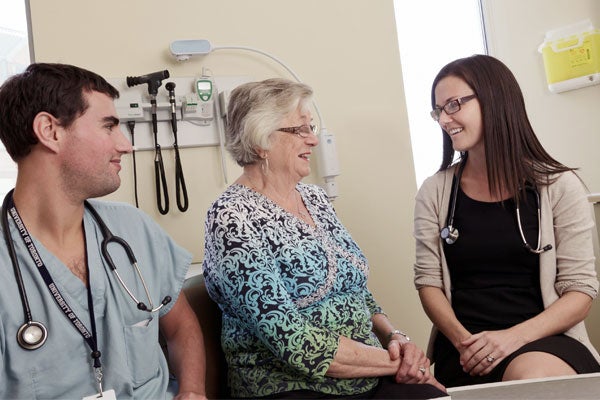
Helping seniors, cancer patients and circumpolar communities
Published: June 26, 2013
University of Toronto medical researchers received more than $7.4 million in research grants June 26 from the Canadian Institutes of Health Research (CIHR) to improve primary health care for Canadians and people around the world.
The funding backs professors in U of T's Department of Family and Community Medicine, Institute of Health Policy, Management and Evaluation and Dalla Lana School of Public Health who are leading international research teams to develop innovative solutions for managing and preventing chronic disease and access issues for vulnerable populations.
Family and Community Medicine Vice-Chair and Professor Dr. Eva Grunfeld is leading the Canadian Team to Improve Community-Based Cancer Care along the Continuum (CanIMPACT) project. The $2.5 million project tackles issues that cancer patients and their families face when transitioning between community-based care with their family doctor and hospital-based care with cancer specialists along the entire cancer journey.
“By setting-up a patient advisory committee, our team of researchers, family doctors, nurses, cancer specialists and policy makers are improving care over the cancer journey, from diagnosis to survivorship,” says Grunfeld, noting the grant provides five years of stable funding for CanIMPACT—the first project of its kind in Canada.
Professor Walter Wodchis of Health Policy, Management and Evaluation is leading an international team with New Zealand collaborators—led by Professor Toni Ashton from the University of Auckland and $1.2 million from the New Zealand Health Research Council—to find new ways to care for seniors with complex needs.
Wodchis and his team are analyzing health policy and consulting care providers and caregivers to design an effective model of community-based primary care for seniors.
“Older adults with complex care needs represent the greatest challenge and opportunity for improving the health care delivery system—costs are high and care is fragmented, duplicative and burdensome to health care providers, patients and caregivers,” says Wodchis, who is an international expert in health economics and recipient of a $2.5 million CIHR grant.
“Our team is looking at successful models of integrated care for this population and find ways to put them into action across Ontario, Quebec and New Zealand.”
Also collaborating with international researchers is Professor Kue Young of the Dalla Lana School of Public Health who is using a $2.4 million CIHR grant to transform primary care for people living in remote northern communities through a Circumpolar Health System Innovation Team.
“Our team is looking at the patient’s health journey to ensure the right care is received at the right time,” says Young, noting that the team will consult with international circumpolar communities for advice as well as build research capacity in the North.
When announcing the $29-million in funding for 12 research teams, federal health minister Leona Aglukkaq, said:
“Community-Based Primary Health Care is the heart of our health care system. Our Government understands that, for most Canadians, primary health care is the most frequent point of contact with the health care system, and we are committed to strengthening this front line of care.
"I am particularly pleased that the teams we are supporting today will also focus on ways to improve access for those most vulnerable among us.”
Nicole Bodnar is a writer with the Faculty of Medicine at the University of Toronto.



